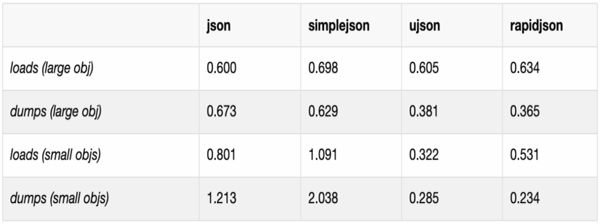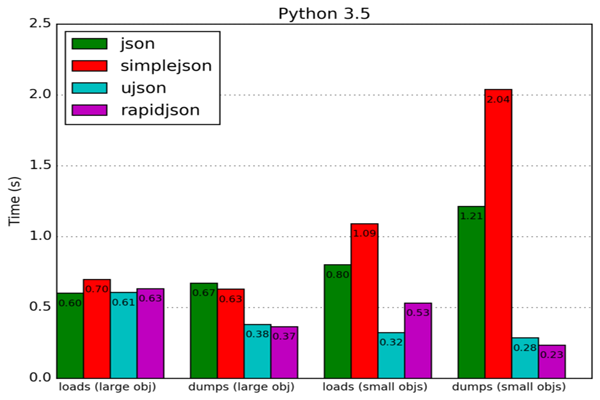在 Python 使用用 json.dumps(data) 时突然发现特别慢,data 本身不大,但是一个包含很多元素的列表,所以促使本人寻找一个替代的 JSON 处理库。大概对比了一个 ujson(UtltraJSON), python-rapidjson(RapidJSON) 和 Python 自带的 json 库。还有一个 simplejson 是为兼容 Python 2.6 以前用的(json 是 Python 2.6 新加入的 API),性能有些差。
基本上姜还是老的辣,想要收获更好的性能,还得仰赖传统的 C/C++ 语言,ujson 是用纯 C 写的,RapidJSON 是 C++ 写的,后者还是十美分的开源产品。json, ujson, rapidjson 三者 loads() 方法的性能差别不太明显,但 dumps() 大对象时 Python 自带的 json 库就要考验用户的耐心了。
注:最开始本来认定了 ujson 为最佳选择, 所以先从 usjon 和 rapidjson 切入的,后来写作本文的过程中,从 usjon 的自我介绍中发现了 Rust 写的 orjson 很显眼,才加入了 orjson 的测试,看来 orjson 更值得拥有。
以上三个 json 组件的安装方式分别为
pip install python-rapidjson
$ pip install simplejson
自己测试了一个 ujson 和 rapidjson 与 Python json 库的 dumps() 的性能,simpejson 不太考虑了。测试代码如下
- # test.py
- from time import time
- import sys
- import string
- num = int(sys.argv[1])
- lib = sys.argv[2]
- items = []
- for i in range(num):
- items.append({c:c for c in string.ascii_letters})
- start = time()
- if lib == 'ujson':
- import ujson
- ujson.dumps(items)
- elif lib == 'rapidjson':
- import rapidjson
- rapidjson.dumps(items)
- else:
- import json
- json.dumps(items)
- print(time() - start)
执行 python 1000|10000|100000|1000000 json|ujson|rapidjson, 试结果统计如下(数字为不同情况下的耗时):
基本上测试的性能和 Benchmark of Python JSON libraries 中的是一致的。从原文中截取了两张图如下:
在 UltraJSON 的 Github 项目页面中也有对比 ujson, nujson, orjson, simplejson, json 的 Benchmarks。其中列出的 orjson(pip install orjson) 和 nujson(pip install nujson, Fork 了 UltraJSON 来支持 Numpy 序列化的) 性能表现上不错,orjson 表现上比 ujson 还更为卓越。
看到了 orjson 后,赶紧做个对比测试,在上面的 test.py 代码中再加上
- elif lib == 'orjson':
- import orjson
- orjson.dumps(items)
再列出完整的对比数据
继续翻看 orjson 的 Github 主页面 ijl/orjson, 它既非用 C 也不是用 C++ 写的,而是 Rust 语言,真是让我眼前一亮,Rust 程序运行速度真的能与 C/C++ 相媲美的。写到这里我要开始改变当初只认 ujson 的主意了,orjson 或许是更佳的选择, 本文的标题也由最初拟定的 “Python 处理 JSON 必要时我选择 ujson(UltraJSON)” 变成了 “Python 处理 JSON 必要时我选择 ujson 和 orjson”。这也是写博客时,尽可能收集更多的素材多的魅力。
补充一下,orjson 的 dumps() 函数使用略有不同,不再用 indent 参数,并且返回值是 bytes,所以格式化成字符串的写法如下
- import orjson
- json_str = orjson.dumps(record, option=orjson.OPT_INDENT_2).decode()
另外,在使用 ujson 时碰到的一个 bug 也顺便记录在此,就不立新篇了,反正现在找东西都不太看标题,而是 Google 到其中的内容。ujson 3.0.0 和 3.1.0 版本的 dumps() 的 indent 参数工作不正常,有个未关闭的 ticket 'indent' parameter for dumps doesn't indent properly in 3.0.0 #415。比如使用 ujson 3.1.0 时的现像是
- >>> import ujson
- >>> ujson.dumps({'a': 1, 'b': 2})
- '{"a":1,"b":2}'
- >>> ujson.dumps({'a': 1, 'b': 2}, indent=0)
- '{"a":1,"b":2}'
- >>> ujson.dumps({'a': 1, 'b': 2}, indent=1)
- '{\n "a": 1,\n "b": 2\n}'
- >>> ujson.dumps({'a': 1, 'b': 2}, indent=2)
- '{\n "a": 1,\n "b": 2\n}'
- >>> ujson.dumps({'a': 1, 'b': 2}, indent=8)
- '{\n "a": 1,\n "b": 2\n}'
indent 大于 1 时都当作 1。
换回到 ujson 2.0.3 版本时没问题
- >>> import ujson
- >>> ujson.dumps({'a': 1, 'b': 2}, indent=2)
- '{\n "a": 1,\n "b": 2\n}'
- >>> ujson.dumps({'a': 1, 'b': 2}, indent=8)
- '{\n "a": 1,\n "b": 2\n}'
在这个问题未解决之前就暂时用 pip install ujson==2.0.3 安装 ujson 2.0.3 吧,但是这个版本无法序列化 datetime 类型。


































